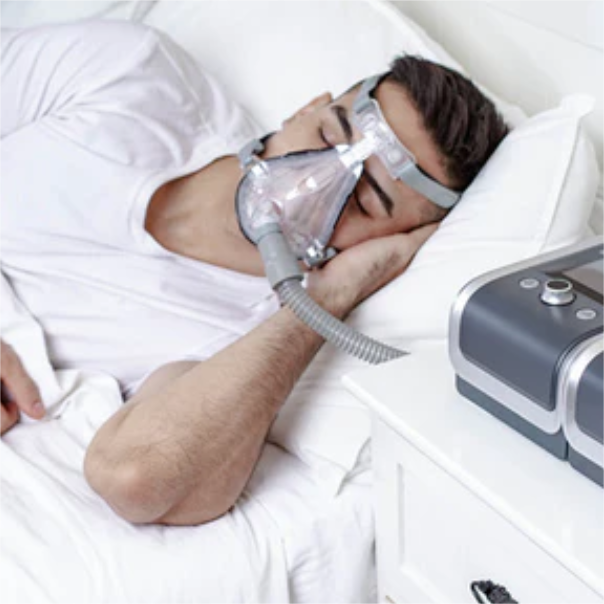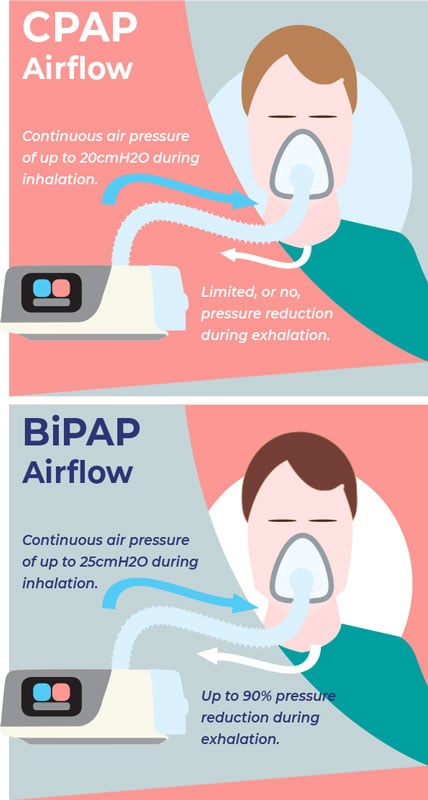Custom-made Plans Available for BiPAP Rental Providers
Custom-made Plans Available for BiPAP Rental Providers
Blog Article
Bipap vs. CPAP: Which Is the very best for Your Sleep Problem?
When browsing the intricacies of rest disorders, the selection in between BiPAP and CPAP therapy is a critical consideration. Each method uses special advantages customized to details problems, yet the decision rests on private client needs and comfort levels. While CPAP provides a steady air movement suitable for obstructive sleep apnea, BiPAP's double pressure setups may enhance comfort for those with even more complex respiratory problems. Understanding these distinctions can considerably impact therapy effectiveness, leaving one to consider which choice really straightens with their health and wellness requirements and lifestyle.
Comprehending Rest Disorders
Sleep problems encompass an array of problems that interfere with typical rest patterns, influencing both the high quality and duration of rest. These conditions can manifest in different kinds, consisting of insomnia, rest apnea, narcolepsy, restless leg syndrome, and parasomnias. Each condition presents one-of-a-kind difficulties, often causing considerable daytime fatigue, cognitive problems, and emotional disturbances.
Sleep problems is defined by difficulty falling or remaining asleep, while sleep apnea includes duplicated interruptions in breathing during rest, often resulting in fragmented remainder. Narcolepsy, on the various other hand, is noted by too much daytime sleepiness and abrupt sleep strikes. Troubled leg disorder causes uncomfortable experiences in the legs, triggering an unmanageable impulse to relocate them, which can additionally hinder the capability to go to sleep.
The impact of sleep conditions prolongs past individual health, influencing overall productivity, partnerships, and lifestyle. Understanding the specific nature of each disorder is important for effective medical diagnosis and therapy. As rest wellness ends up being significantly recognized as an important element of general health, addressing these disorders is important for enhancing both rest top quality and day-to-day performance.
Exactly How CPAP Works
Constant Favorable Air Passage Pressure (CPAP) treatment is regularly utilized as a primary treatment for obstructive sleep apnea (OSA) The device of CPAP includes making use of a maker that delivers a stable stream of air with a mask put on during rest. This airflow maintains positive stress in the air passage, stopping the collapse or blockage of the throat that can happen during rest.
When a person takes a breath in, the CPAP maker offers a continual flow of air, making certain that the airway continues to be open - BiPAP Rental. This not just minimizes the symptoms of OSA, such as snoring and interfered with rest patterns, but additionally decreases the affiliated wellness dangers, consisting of cardiovascular complications and daytime tiredness
The pressure setups on a CPAP device can be tailored to meet individual patient requirements, commonly identified via a rest research study. People normally undergo titration research studies to locate the ideal stress level for their unique condition. Routine follow-up and modifications may be required to guarantee efficiency and comfort. On the whole, CPAP therapy has been revealed to substantially boost the quality of rest and general health and wellness for people experiencing obstructive rest apnea.
Exactly How BiPAP Works
BiPAP, or Bilevel Favorable Air Passage Pressure, is a specific type of non-invasive ventilation that is especially helpful for clients with conditions such as complicated rest apnea or breathing disorders. Unlike CPAP, which delivers a constant stream of air at a single pressure, BiPAP check this provides 2 distinct pressure setups: a greater inspiratory stress for breathing and a reduced expiratory pressure for exhalation. This dual-pressure technique enables much easier breathing, decreasing the initiative called for during exhalation.
The device operates through a mask fitted over the nose or mouth, connected to a device that generates atmospheric pressure. When the client inhales, the machine supplies the greater stress to help with air movement, making certain that the airway stays open. Upon exhalation, the device immediately decreases the stress, making it a lot more comfy for the individual to breathe out.

Key Distinctions Between BiPAP and CPAP

In comparison, BiPAP (Bilevel Favorable Air passage Stress) provides two various pressure settings: one for breathing and a reduced one for exhalation. This dual pressure system enables more comfortable breathing, especially for people who battle with breathing out versus a continuous pressure. BiPAP is often advised for patients with complicated additional hints rest apnea, persistent obstructive lung condition (COPD), or those that require additional assistance throughout sleep.
Moreover, the intricacy of BiPAP devices generally causes a higher expense and calls for much more cautious titration than CPAP. BiPAP Rental. Recognizing these vital distinctions can help in acknowledging which device may be much more suitable for specific sleep problems, setting the groundwork for enlightened therapy choices
Choosing the Right Therapy
The choice in between BiPAP and CPAP treatment mostly hinges on the particular qualities of the rest condition, the client's overall health, and their convenience with the gadget. CPAP, which delivers a continual stream of air, is generally recommended for obstructive sleep apnea (OSA)
Alternatively, BiPAP supplies two degrees of pressure: one for inhalation and a lower one for exhalation. This twin stress system is valuable for individuals with complex rest apnea or those that experience problem breathing out against a continual stress. Additionally, BiPAP is often recommended for people with breathing problems, such as chronic obstructive lung illness (COPD), where differing pressure setups can enhance convenience and conformity.
Inevitably, a detailed evaluation by a rest expert, consisting of a sleep research study, can assist establish which therapy straightens best with the patient's needs. Elements such as convenience, ease of use, and details medical problems ought to likewise be taken into account to optimize therapy outcomes.
Conclusion
In recap, both BiPAP and CPAP serve distinctive purposes in the management of sleep disorders. CPAP is efficient for obstructive rest apnea via regular air movement, while BiPAP supplies twin stress setups that enhance comfort for those with complex sleep apnea or respiratory system problems. The selection between these therapies ought to be directed by private demands and problems, requiring a thorough examination by a rest professional to guarantee optimum treatment outcomes and boosted top quality of sleep.

On the whole, CPAP therapy has been revealed to considerably improve the high quality of rest and total health for individuals experiencing from obstructive sleep apnea.
BiPAP is often advised for people with complex sleep apnea, persistent obstructive pulmonary disease (COPD), or those who need extra assistance during sleep.
CPAP is efficient for obstructive sleep apnea with regular airflow, while BiPAP provides look at here now dual stress setups that improve comfort for those with intricate sleep apnea or respiratory issues.
Report this page